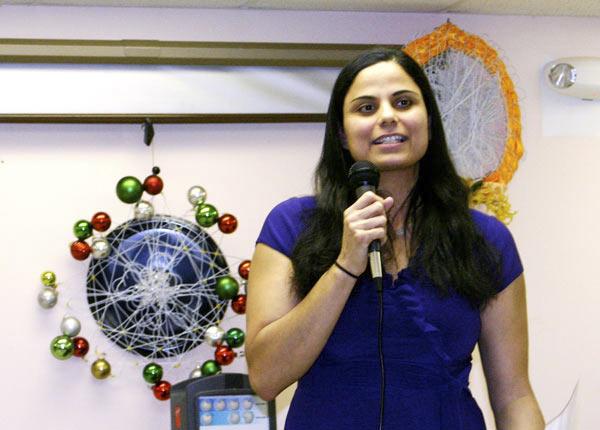When writer and activist Stacy Parker Le Melle was a freshman at GW, she wrote poetry in her room in Thurston Hall and took walks to the White House. A few months into fall 1992, that walk became her commute.
She volunteered for the Presidential Inaugural Committee, which set up offices in the Marvin Center. This eventually helped her win a position in the Clinton White House, where she worked as an intern for four years under political adviser George Stephanopoulos in the Eisenhower Executive Office Building’s press office. She published a memoir about her experience, “Government Girl: Young and Female in the White House,” in 2010.
“It was an extraordinary 360 [degree] experience for me because I was in the political communication program at GW [and] I was seeing it happen in real time,” she said in a phone interview.
Le Melle is now the workshop director for the Afghan Women’s Writing Project, which gives women in Afghanistan a forum to share their stories and poetry, unfiltered by male relatives or the media. The group aims to bring laptops, books and the Internet to women even in Taliban-controlled regions.
This part-time work, she said, has allowed her to be a stay-at-home parent for the last four years. Le Melle teaches online workshops about storytelling with women halfway across the world and also stages readings of their writing in and around New York.
“I hope to continue creative work that fights invisibility – one story at a time,” she said. “I wish to keep writing and teaching. Both are serious crafts [and] if you want to be any good, you have to keep at it. I hope to always be fighting the silence that kills.”
After graduating magna cum laude with a bachelor’s degree in political communication, and attending Oxford University for a year on a J.B. and Maurice C. Shapiro Scholarship, Le Melle came back to the District to work for Paul Begala, a chief campaign strategist and counselor to President Bill Clinton.
With the exception of a stint as special assistant to then-New York Gov. David Paterson, she abandoned government service entirely in 1998 to pursue the humanities and write the oral histories of others.
Le Melle said she loved to see politicians fight for progress in the White House. But when details about Monica Lewinsky were unleashed in January 1998, she learned how arduous political life could be as the First Family and Lewinsky, who recently gave a TED Talk, were scrutinized in the scandal’s wake.
“I realized as much as I respect government service and [know that] we need amazing people doing it, I would rather be on the outside … able to write and speak as freely as possible, free to make my own mistakes and be an artist,” she said.
She went back to her hometown, Detroit, to teach. Le Melle said she spent some years feeling “depressed politically,” and until 2005, she focused on her students’ writing as well as her own.
“I didn’t want to be involved in [politics],” she said. “But then Katrina hit. I didn’t start teaching until later in September, and I was watching CNN nonstop.”
She starting sending emails about what she saw and one of her mentors, journalist Sidney Blumenthal, suggested she interview evacuees. Le Melle volunteered at the George R. Brown Convention Center in Houston, where New Orleans residents were arriving in droves – and she brought a recorder.
“There was a real fear that the victims were going to be blamed,” she said. “It was very important to get these first impressions and early stories down so that they couldn’t be cleared away.”
This became The Katrina Experience: An Oral History Project, a collection of 125 interviews that gave survivors a voice in a collective narrative. The project also aimed to improve the way catastrophes are handled. Le Melle said she hopes that by sharing stories, “people become more humanized in each other’s eyes.”
Since 2005, Le Melle has continued to blend advocacy with writing. She is the co-founder of the First Person Plural Reading Series in Harlem, a series that showcases creative work from the neighborhood where she lives. She is also the founder of Harlem Against Violence, Homophobia and Transphobia, an anti-hate coalition.
“Because I am focused on rooting and making a home here in Harlem for my family, I am deeply motivated to create cultural events and to pursue teaching and volunteer work here in New York City, especially in Harlem,” Le Melle said in a follow-up email.
She is also a contributor to The Huffington Post, writing about topics like the New York Police Department and gun control, and also conducts interviews with local filmmakers and authors.
Steven Livingston, a professor of political communication, said Le Melle’s desire to make a difference was the quality that stood out most to him. Livingston, a former director of the political communication program and the School of Media and Public Affairs, was a mentor to Le Melle.
“She is very, very bright and engaged with the world and with ideas and with a desire to do meaningful things in one’s life,” he said.
Le Melle said she was “treated very seriously as a scholar” when she was a student. Looking back, she credits her early success in the White House to being humble, being assertive and having good timing.
“Go with humility. You’re never going to know it all. You don’t want to go into a [work] environment feeling entitled,” she said.
In the print version of this article, The Hatchet incorrectly reported Stacy Parker Le Melle’s name as Stacy Le Melle Parker in a photo caption. We regret the error.







